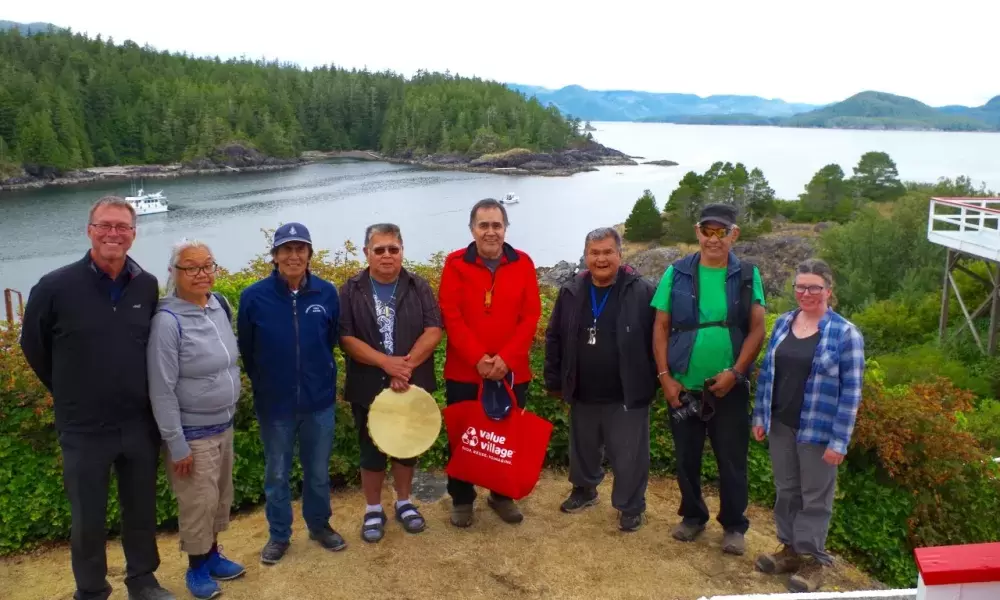Mowachaht/Muchalath elders are planning for the re-interment of ancestral remains recovered from Nootka Lighthouse last summer.
A small and discrete ceremony was planned for Tuesday, Dec. 11, at Yuquot, but this was postponed to a later date when weather conditions improve access to the Nootka Island village site. The two sets of remains — belonging to a woman and adolescent who lived 1,000 years ago — are to be reinterred following the Nuu-chah-nulth burial practice.
“The elders will be doing a small ceremony, very private,” said Kevin Kowalchuk, MMFN administrator. “It will be a ceremony somewhat similar to what we did for the killer whale.”
The whale ceremony was held in November to honour the spirit of a baby orca that died and washed ashore on Nootka Island. In this instance, one of the elders has carved a pair of small cedar boxes to hold the partial remains. They were unearthed as a result of an archeological assessment undertaken on San Rafael Island, off the southern tip of Nootka Island, to make way for light station upgrades.
“The elders decided they wanted to get it done rather than waiting until spring,” Kowalchuk said.
Archeologist Colleen Parsley concluded that the remains were probably deposited decades ago by lighthouse keepers in soil removed from the nearby village for a garden. The bones were radiocarbon-dated and determined to be from a millennium ago.
About a half dozen or so people are expected to attend the ceremony, which will proceed when weather allows helicopter flights out to the island. Not many boats travel out to the exposed location at this time of year.
“It’s a matter of transportation and making sure we can get everybody out there,” Kowalchuk said. Winter storms can be an issue. No MMFN staff will be attending, he said.
Part of the reason for the low-key approach is to ensure the site remains as secure as possible from curious visitors and potential theft. After all, the remains have been disturbed once already when they were deposited at the lighthouse. With increased marine traffic stopping at Yuquot, they have reason to be cautious.
Ray Williams, who has lived at Yuquot all his life, learned of the ceremony just a couple of weeks ago at an elders meeting.
“I suggested to them that we should do the proper thing and the right thing, and that’s to place them in a cave,” he said.
“That’s the thing that was done 1,000 years ago. It’s not a good idea to bury the boxes in the ground,” he added, suggesting it could have negative consequences.
Hereditary Chief Jerry Jack Jr. will lead a cii’qaa, a prayer chant, before the boxes are placed in the cave.
“Our people are going to walk the boxes there, bring them through the reserve and into the cave,” Williams said
As much as anyone, he was surprised by the discovery of the remains.
“In a way, it’s really sad for them to have discovered the bones there,” he said. “People are really touched by what they found.”
Williams and his wife reside year-round at Yuquot, an important centre of the Mowachaht world. Most of the villagers relocated to Tsaxana (Gold River) in the 1960s. Now 78, he never considered the possibility, even when the Department of Northern and Indian Affairs promised to cover the cost of relocating.
A social worker suggested the couple is getting too old to reside in such an isolated place, that it’s risky and they should move into town, but they have a grandson and great-grandson living with them now. He’s heard those same arguments going back to the early 1960s — that it was costing too much to remain in Yuoquot. The commissioner of Indian Affairs in Campbell River would phone now and then.
“It’s crazy. People have lived here for thousands of years,” Williams said, listing their abundant sources of food.
“You’re asking me to do something I can’t do,” he told the commissioner. “He never called again.”
He remains steadfast in the conviction that Yuquot should be more formally recognized for its Nuu-chah-nulth cultural and historic importance, not merely for the landing of Capt. James Cook, which heralded European arrival.
“It’s a very, very powerful place here,” he said
Parsley contends that Yuquot’s heritage warrants greater legal protection.







